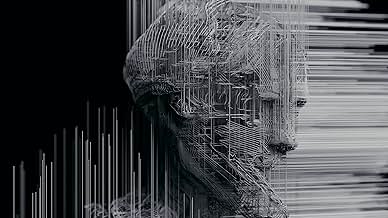Aggiungi una trama nella tua linguaThe documentary follows the booming artificial intelligence industry, what opportunities and challenges it brings and its impact on the global community.The documentary follows the booming artificial intelligence industry, what opportunities and challenges it brings and its impact on the global community.The documentary follows the booming artificial intelligence industry, what opportunities and challenges it brings and its impact on the global community.
- Premi
- 2 candidature totali
Zeynep Tüfekçi
- Self - Sociologist
- (as Zeynep Tüfeçki)
Jurgen Schmidhuber
- Self - AI Researcher
- (as Jürgen Schmidhuber)
Stuart J. Russell
- Self - AI Researcher
- (as Stuart Russel)
Recensioni in evidenza
Tonje Hessen Schei clearly has an agenda with this film. It is not a neutral dissertation of AI, its potential and dangers. We are in the middle of a revolution in terms of AI, though true AI seems rather far away still. (Current ML, "deep learning" algorithms and synthetic neural networks are actually very primitive compared to the human intelligences that created them). Hessen Schei said in an introduction to the screening I attended that she thinks there is too little attention paid to and conversation about AI in terms of how it will change society, democracy and the way we live. Even though I use ML and "AI" in my work and know the tech fairly well, I still found the framing and the questions asked in the film to be engadging. Some of the talking heads come off as rather naive, despite all their apparent brilliance. I found it amusing that some of these highly intelligent people (probably inadvertently) support some level of pre-destination, i.e. that AI is inevitable. Also, it raises questions dating back at least Oppenheimer about the culpability of scientists. To quote Jeff Goldblums character in Jurassic Park "Your scientists were so preoccupied with whether they could, they didn't stop to think if they should." which more or less summarizes the theme of iHuman and why we should stop and think.
I would have liked to hear inside opinions from the big players like Google and Amazon, but ominously they refused to be interviewed.
I think the documentary was expertly made with both incredible audio design (think Sci-fi in general, Blade Runner I+II in particular) and visuals. Talking head fatigue is mostly avoided. Like I said initially, the film clearly has an agenda and the director is using every trick in her impressive arsenal to influence us, the audience. Some of the shots are amazingly beautiful as well. The shot of Juergen Schmidhuber looking out upon creation from his vantage point on top of the Alps is both amusing and has serious historical connotations.
PS! About the Schmidhuber scene, a previous reviewer wrote: "it's just another example of how millenials like this doc maker play with history :-)". Actually it is not. Firstly, Hessen Schei is most definetely Genaration X (born 1971 according to Google). Secondly, this is something that has nothing to do with generations but rather much more with having a sense of wit and visual humour. There have been plenty of similarly thematically loaded images in docs by Boomers, Xers (my gen) and Millenials.
I would have liked to hear inside opinions from the big players like Google and Amazon, but ominously they refused to be interviewed.
I think the documentary was expertly made with both incredible audio design (think Sci-fi in general, Blade Runner I+II in particular) and visuals. Talking head fatigue is mostly avoided. Like I said initially, the film clearly has an agenda and the director is using every trick in her impressive arsenal to influence us, the audience. Some of the shots are amazingly beautiful as well. The shot of Juergen Schmidhuber looking out upon creation from his vantage point on top of the Alps is both amusing and has serious historical connotations.
PS! About the Schmidhuber scene, a previous reviewer wrote: "it's just another example of how millenials like this doc maker play with history :-)". Actually it is not. Firstly, Hessen Schei is most definetely Genaration X (born 1971 according to Google). Secondly, this is something that has nothing to do with generations but rather much more with having a sense of wit and visual humour. There have been plenty of similarly thematically loaded images in docs by Boomers, Xers (my gen) and Millenials.
Entertaining and engaging documentary. Comes at this topic more from the angle of what could be, and is, the negative impact of data harvesting and analysis etc. The way it is edited ironically suggests a certain bias, as the extremes of AI and algorithms are shown as Brexit, Trump, Bolsanaro etc. But it provides no smoking gun and ignores the fact that the big tech companies and employees who create these algorithms tilt more to the left. So while 3rd parties manipulating the model to incite "right wing" movements is certainly there for debate, it does little to touch on the broader topic of the bias of the algorithm designers themselves. I liked and enjoyed watching it, and recommend it, but it does itself illustrate the difficulty of avoiding bias.
Saw this documentary at IDFA 2019, the documentary festival in Amsterdam. This movie did not bring much news for me. This is not to be construed as a complaint. Rather the contrary, as I'll explain later. Much of this was already a topic of growing concern in IT-related journals. Also, lectures held at congresses and seminars presented ample eye-openers in this field, once I became aware of it and began following relevant specialists in the field. In other words, I was not taken by surprise when watching the very many relevant issues passing by. However, that is me, and it is more relevant to make the general public aware, and policy makers in particular.
I know it is not easy to find the right packaging for IT-related contents. I especially know how difficult it is to find the right visuals to support the message on screen. Of course, we now (again) saw the obligatory amount of screen gibberish (mainly program source text), network cabling, flashing lights on appliances, the insides of a server farm, and other boring images seemingly unevitable in this context. Talking heads cannot be avoided either. Nevertheless, I know of no better alternative to present the alarming message. The filmmakers used sort of an all-knowing narrator who guided us throught subsequent stories. I'm not sure that is the best solution, but it may work very well with an uninformed viewer who will intuitively build some trust in this man because of his reputation.
I asked my companion, not working in IT, rather one of the power-user type, about the eye-opening effects for her. She confirmed that this movie worked indeed and could very well serve its purpose to show interested people the many dangers ahead. Of course, those who are not interested at all, cannot be convinced with either talkshow, movie, book or article, so are beyond hope on all counts.
All in all, I suspect that this movie can do a good job of educating people on these very relevant topics, pertinent for everyone and certainly not confined to the world of IT. We cannot leave the decisions to the technicians who work there. We should particularly distrust their management, only interested in short-term profit, and damn the consequences. Politicians do not know yet how important it is for them to step in very soon, rather than wait until the problems become too big to unravel in hindsight. A few high-profile incidents in recent years (Facebook and Cambridge Analytics, among others), may be considered later as a blessing in disguise, by showing the average man/woman how these matters affect their lives. It remained under the hood for too long a time.
I know it is not easy to find the right packaging for IT-related contents. I especially know how difficult it is to find the right visuals to support the message on screen. Of course, we now (again) saw the obligatory amount of screen gibberish (mainly program source text), network cabling, flashing lights on appliances, the insides of a server farm, and other boring images seemingly unevitable in this context. Talking heads cannot be avoided either. Nevertheless, I know of no better alternative to present the alarming message. The filmmakers used sort of an all-knowing narrator who guided us throught subsequent stories. I'm not sure that is the best solution, but it may work very well with an uninformed viewer who will intuitively build some trust in this man because of his reputation.
I asked my companion, not working in IT, rather one of the power-user type, about the eye-opening effects for her. She confirmed that this movie worked indeed and could very well serve its purpose to show interested people the many dangers ahead. Of course, those who are not interested at all, cannot be convinced with either talkshow, movie, book or article, so are beyond hope on all counts.
All in all, I suspect that this movie can do a good job of educating people on these very relevant topics, pertinent for everyone and certainly not confined to the world of IT. We cannot leave the decisions to the technicians who work there. We should particularly distrust their management, only interested in short-term profit, and damn the consequences. Politicians do not know yet how important it is for them to step in very soon, rather than wait until the problems become too big to unravel in hindsight. A few high-profile incidents in recent years (Facebook and Cambridge Analytics, among others), may be considered later as a blessing in disguise, by showing the average man/woman how these matters affect their lives. It remained under the hood for too long a time.
Personally I've seen nothing new on AI although some given insights by people connected to the industry were quite interesting...
The presentation of a Swiss as a 'father of AI' on a mountain hill was pretty amusing as it's just another example how millenials like this doc maker play with history :)
AI was found as a discipline in the 50s of the last century and thoughts about raised way earlier..
The part on robotics was also limited to the work of the Swiss 'AI father' and a sight on the Sophia 'humanoid' with just some shots on the better examples available in Japan as well as more interesting visions about implementation of those devices in that country.
For some the use of graphics to boost the perception that something fearsome is about to happen might have been helpful :)
I wonder what viewers at the IDFA screening picked up when they left the theater as many of them grabbed their phones and most likely used AI driven tools to let their digital friends know what they just have seen...
Slow movie with a lot of presumably competent people offering their predictions of the future life with AI. Nicely done and with a lot of ambience. But its all been told before, and there's nothing new or revealing. Becomes repetitive and kind of boring.
Lo sapevi?
- ConnessioniEdited into Storyville: iHuman (2023)
I più visti
Accedi per valutare e creare un elenco di titoli salvati per ottenere consigli personalizzati
- How long is iHuman?Powered by Alexa
Dettagli
- Data di uscita
- Paese di origine
- Lingue
- Celebre anche come
- iHuman: L'intelligence artificielle et nous
- Luoghi delle riprese
- Aziende produttrici
- Vedi altri crediti dell’azienda su IMDbPro
Botteghino
- Lordo in tutto il mondo
- 80.105 USD
- Tempo di esecuzione1 ora 39 minuti
- Colore
- Proporzioni
- 1.78 : 1
Contribuisci a questa pagina
Suggerisci una modifica o aggiungi i contenuti mancanti






















